RUMEYSA OZTURK, YUNSEO CHUNG and BADAR KHAN SURI

Rumeysa Ozturk, Badar Khan Suri and Yunseo Chung are now facing the reality of proomoting Hamas in the USA - DEPORTATION
FOREIGN BORN STUDENTS STUDYING IN THE US WHILE PROMOTING TERRORISM EXPECTED CITIZENS’ RIGHTS
BY SNN.BZ STAFF
In a significant and troubling development, Rumeysa Ozturk, a foreign student, was arrested for promoting anti-U.S. government behavior and advocating for Palestinian Hamas leaders. Ozturk’s actions, which included protesting on behalf of a group designated by the U.S. government as a terrorist organization, have raised serious questions about the line between free speech and national security, particularly when it comes to non-citizens on U.S. soil. Her arrest serves as a critical reminder of the severe consequences of supporting groups responsible for unspeakable violence.



The Hamas organization, widely recognized for its acts of terror, murder, and chaos, remains a declared enemy of the United States. Its tactics, including suicide bombings, rocket attacks, and the targeting of civilians, have caused untold suffering in the Middle East. For any foreigner in the U.S., advocating for such a group does not fall under the protection of free speech. Instead, it places that individual squarely on the side of those who are engaged in violent actions against American interests and citizens.
What makes this case particularly important is not just the arrest itself, but the broader implications for students and others who may be unaware of the gravity of supporting a group like Hamas. Rumeysa Ozturk, by aligning herself with this group, unknowingly placed herself in direct opposition to U.S. laws and national security. As a foreign national, she had no right to expect the same protections under the U.S. Constitution that citizens are granted. While U.S. citizens may, within limits, express controversial opinions, non-citizens cannot advocate for those who are enemies of the United States without facing severe legal repercussions, including deportation.
Contrast this with the case of Yunseo Chung, another student who avoided arrest but has had her student visa and permanent resident status revoked. Chung, like Ozturk, expressed support for a terrorist group, but instead of facing immediate arrest, she now faces the uncertainty of her immigration status. The revocation of her visa is a reminder that the U.S. government is unwavering in its commitment to national security. Advocacy for terrorism is a serious offense, and Chung’s case demonstrates that even if one avoids immediate legal action, the consequences for supporting terrorist organizations are far-reaching.
Similarly, Badar Khan Suri, another individual with ties to extremist activities, has been closely monitored for his support of violent groups. His case exemplifies how the U.S. government scrutinizes foreign nationals who make such allegiances. The lesson here is clear: the U.S. government does not tolerate the promotion of terrorism, and anyone found to be harboring or supporting these groups will face not only legal penalties but potential deportation.
It is important to emphasize that young people, particularly students, often find themselves in environments where they may be shielded from the full truth of what groups like Hamas have done. Their education may be incomplete, or their exposure to media may paint a distorted picture of these groups as political or resistance movements. However, the reality is far more brutal. Hamas has a long history of terrorizing civilian populations, using violence to advance its political agenda. To support such an organization is not just a political statement; it is a dangerous endorsement of violence and murder.
In the case of foreigners in the United States, supporting such groups goes far beyond a mere difference of opinion. It places them in direct conflict with U.S. law and national security interests. Foreign nationals are not entitled to the same legal protections as U.S. citizens, and advocating for terrorism can, and often does, result in serious consequences, including deportation.
While it is essential to protect free speech, it is equally important to understand the limits of that protection, especially when it comes to promoting violence and supporting groups that harm innocent people. Advocating for terrorism is not a matter of free expression—it is an endorsement of violence that can destabilize societies and lead to unnecessary suffering.
This case serves as a strong warning for young people, particularly those who may be drawn to extremist ideologies without fully understanding the implications of their actions. The allure of supporting a cause without recognizing its true nature can have devastating consequences—not just for the individuals involved, but for society as a whole. It is crucial that students and young people take the time to understand the true nature of the groups they may be tempted to support. Promoting or harboring individuals or organizations that pose a threat to national security will not be tolerated, and it is essential that everyone, especially foreign nationals, understand the serious consequences of such behavior.
As we reflect on the cases of Rumeysa Ozturk, Yunseo Chung, and Badar Khan Suri, it becomes clear that advocating for terrorism is a dangerous and illegal act. The U.S. government will take firm action against those who choose to support violent and extremist groups, regardless of their status or nationality. The message is simple: supporting terrorism is not free speech—it is a threat to the safety and security of the nation, and those who do so will face the full force of the law.
If Columbia University’s Administration does not straighten out and follow the law – they will lose $400 Million Dollars. Being a permanent legal resident does not mean that you can defend United States enemy terrorists. The judge, is free to say anything she wants since she does not face deportation. Once Homeland Security removes these characters and others like them from American soil, foreign students being hosted by the United States will learn that while they are here they had better change their tune because there really is a new sheriff in town.
All students must recognize that when they are studying in a foreign country, they cannot promote and cheer on the terrorists that have brought violence against that host country. It’s especially hypocritical when they know they wouldn’t dare behave that way in their own countries where they would be incarcerated for that behavior.





 Afrikaans
Afrikaans Albanian
Albanian Amharic
Amharic Arabic
Arabic Armenian
Armenian Azerbaijani
Azerbaijani Basque
Basque Belarusian
Belarusian Bengali
Bengali Bosnian
Bosnian Bulgarian
Bulgarian Catalan
Catalan Cebuano
Cebuano Chinese (Simplified)
Chinese (Simplified) Chinese (Traditional)
Chinese (Traditional) Corsican
Corsican Croatian
Croatian Czech
Czech Danish
Danish Dutch
Dutch Esperanto
Esperanto Estonian
Estonian Filipino
Filipino Finnish
Finnish French
French Frisian
Frisian Galician
Galician Georgian
Georgian German
German Greek
Greek Gujarati
Gujarati Haitian Creole
Haitian Creole Hausa
Hausa Hawaiian
Hawaiian Hebrew
Hebrew Hindi
Hindi Hmong
Hmong Hungarian
Hungarian Icelandic
Icelandic Indonesian
Indonesian Irish
Irish Italian
Italian Japanese
Japanese Javanese
Javanese Kannada
Kannada Kazakh
Kazakh Khmer
Khmer Korean
Korean Kyrgyz
Kyrgyz Lao
Lao Latin
Latin Latvian
Latvian Lithuanian
Lithuanian Luxembourgish
Luxembourgish Macedonian
Macedonian Malagasy
Malagasy Malay
Malay Malayalam
Malayalam Maltese
Maltese Maori
Maori Marathi
Marathi Mongolian
Mongolian Myanmar (Burmese)
Myanmar (Burmese) Nepali
Nepali Norwegian
Norwegian Pashto
Pashto Persian
Persian Polish
Polish Portuguese
Portuguese Punjabi
Punjabi Romanian
Romanian Russian
Russian Samoan
Samoan Scottish Gaelic
Scottish Gaelic Serbian
Serbian Sesotho
Sesotho Shona
Shona Sindhi
Sindhi Sinhala
Sinhala Slovak
Slovak Slovenian
Slovenian Somali
Somali Spanish
Spanish Sundanese
Sundanese Swahili
Swahili Swedish
Swedish Tajik
Tajik Tamil
Tamil Telugu
Telugu Thai
Thai Turkish
Turkish Ukrainian
Ukrainian Urdu
Urdu Uzbek
Uzbek Vietnamese
Vietnamese Welsh
Welsh Yiddish
Yiddish Yoruba
Yoruba Zulu
Zulu